Qualitative Report on Coping Mechanisms During COVID-19 Lockdown
VerifiedAdded on 2022/12/05
|10
|3052
|411
Report
AI Summary
This report presents a qualitative research study investigating the most prevalent coping mechanisms employed during the COVID-19 lockdown. The research aims to identify the strategies individuals used to manage stress, anxiety, and other psychological challenges associated with the lockdown. The methodology includes a literature review, outlining existing research on the topic, followed by a description of the primary research approach, which utilizes unstructured interviews with 30 participants selected through clustered sampling. Data analysis is performed using interpretive methods to understand the meaning and draw valid conclusions from the interview responses. The findings reveal that many participants experienced mental health issues, including stress and anxiety, and the discussion section provides detailed insights into the participants' experiences and coping strategies. The research concludes with recommendations for positive coping strategies and highlights the importance of addressing mental health during times of crisis.
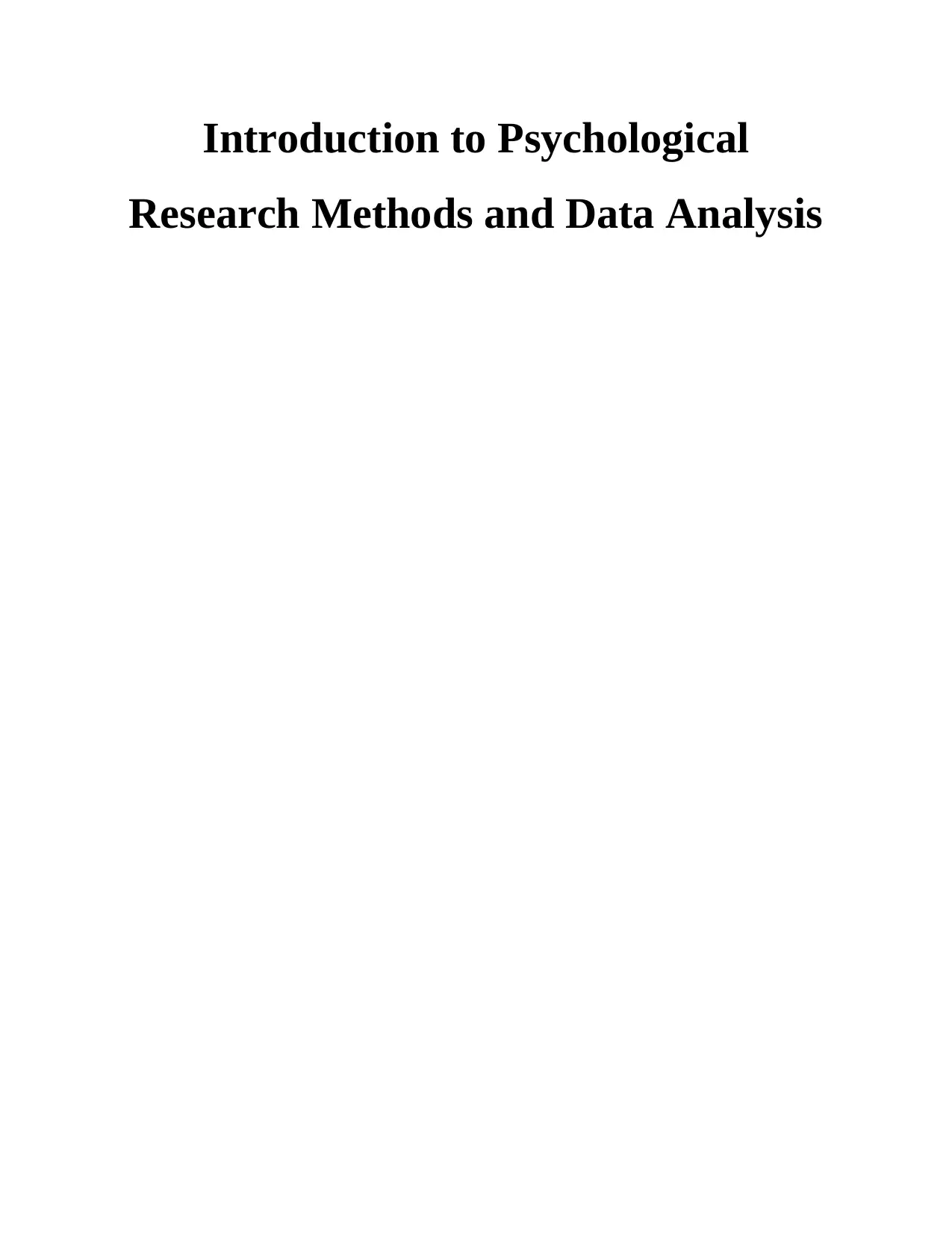
Introduction to Psychological
Research Methods and Data Analysis
Research Methods and Data Analysis
Paraphrase This Document
Need a fresh take? Get an instant paraphrase of this document with our AI Paraphraser
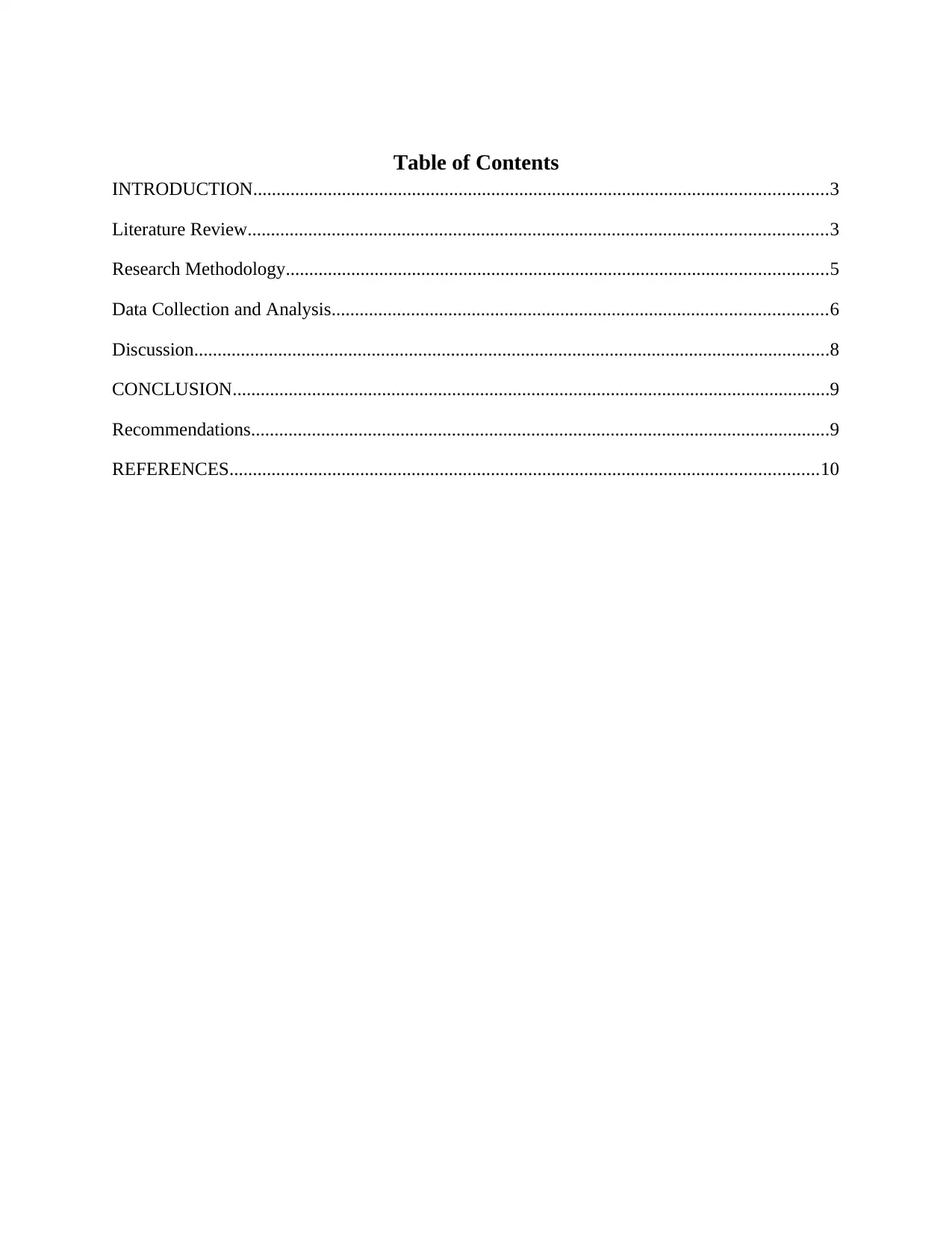
Table of Contents
INTRODUCTION...........................................................................................................................3
Literature Review............................................................................................................................3
Research Methodology....................................................................................................................5
Data Collection and Analysis..........................................................................................................6
Discussion........................................................................................................................................8
CONCLUSION................................................................................................................................9
Recommendations............................................................................................................................9
REFERENCES..............................................................................................................................10
INTRODUCTION...........................................................................................................................3
Literature Review............................................................................................................................3
Research Methodology....................................................................................................................5
Data Collection and Analysis..........................................................................................................6
Discussion........................................................................................................................................8
CONCLUSION................................................................................................................................9
Recommendations............................................................................................................................9
REFERENCES..............................................................................................................................10
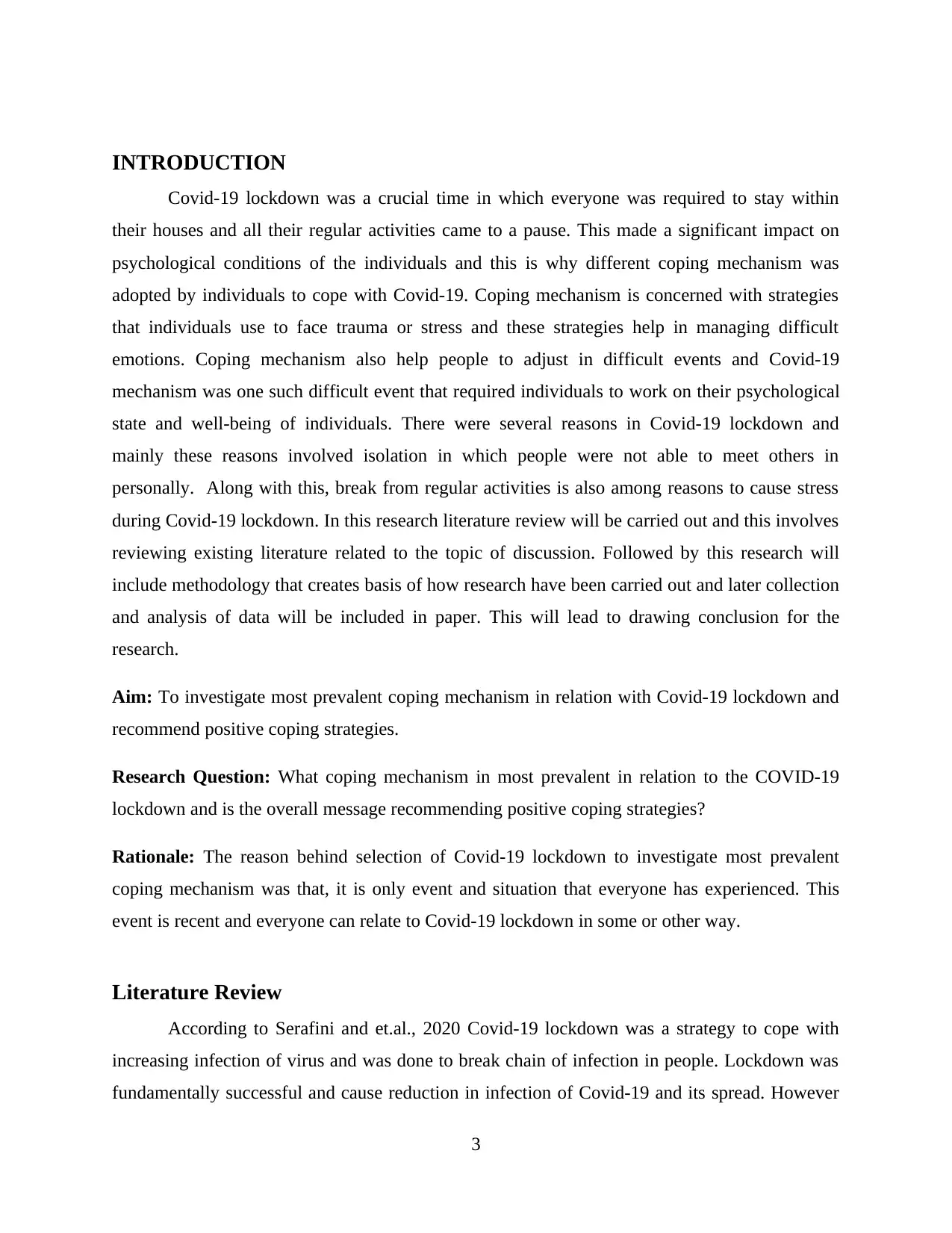
INTRODUCTION
Covid-19 lockdown was a crucial time in which everyone was required to stay within
their houses and all their regular activities came to a pause. This made a significant impact on
psychological conditions of the individuals and this is why different coping mechanism was
adopted by individuals to cope with Covid-19. Coping mechanism is concerned with strategies
that individuals use to face trauma or stress and these strategies help in managing difficult
emotions. Coping mechanism also help people to adjust in difficult events and Covid-19
mechanism was one such difficult event that required individuals to work on their psychological
state and well-being of individuals. There were several reasons in Covid-19 lockdown and
mainly these reasons involved isolation in which people were not able to meet others in
personally. Along with this, break from regular activities is also among reasons to cause stress
during Covid-19 lockdown. In this research literature review will be carried out and this involves
reviewing existing literature related to the topic of discussion. Followed by this research will
include methodology that creates basis of how research have been carried out and later collection
and analysis of data will be included in paper. This will lead to drawing conclusion for the
research.
Aim: To investigate most prevalent coping mechanism in relation with Covid-19 lockdown and
recommend positive coping strategies.
Research Question: What coping mechanism in most prevalent in relation to the COVID-19
lockdown and is the overall message recommending positive coping strategies?
Rationale: The reason behind selection of Covid-19 lockdown to investigate most prevalent
coping mechanism was that, it is only event and situation that everyone has experienced. This
event is recent and everyone can relate to Covid-19 lockdown in some or other way.
Literature Review
According to Serafini and et.al., 2020 Covid-19 lockdown was a strategy to cope with
increasing infection of virus and was done to break chain of infection in people. Lockdown was
fundamentally successful and cause reduction in infection of Covid-19 and its spread. However
3
Covid-19 lockdown was a crucial time in which everyone was required to stay within
their houses and all their regular activities came to a pause. This made a significant impact on
psychological conditions of the individuals and this is why different coping mechanism was
adopted by individuals to cope with Covid-19. Coping mechanism is concerned with strategies
that individuals use to face trauma or stress and these strategies help in managing difficult
emotions. Coping mechanism also help people to adjust in difficult events and Covid-19
mechanism was one such difficult event that required individuals to work on their psychological
state and well-being of individuals. There were several reasons in Covid-19 lockdown and
mainly these reasons involved isolation in which people were not able to meet others in
personally. Along with this, break from regular activities is also among reasons to cause stress
during Covid-19 lockdown. In this research literature review will be carried out and this involves
reviewing existing literature related to the topic of discussion. Followed by this research will
include methodology that creates basis of how research have been carried out and later collection
and analysis of data will be included in paper. This will lead to drawing conclusion for the
research.
Aim: To investigate most prevalent coping mechanism in relation with Covid-19 lockdown and
recommend positive coping strategies.
Research Question: What coping mechanism in most prevalent in relation to the COVID-19
lockdown and is the overall message recommending positive coping strategies?
Rationale: The reason behind selection of Covid-19 lockdown to investigate most prevalent
coping mechanism was that, it is only event and situation that everyone has experienced. This
event is recent and everyone can relate to Covid-19 lockdown in some or other way.
Literature Review
According to Serafini and et.al., 2020 Covid-19 lockdown was a strategy to cope with
increasing infection of virus and was done to break chain of infection in people. Lockdown was
fundamentally successful and cause reduction in infection of Covid-19 and its spread. However
3
⊘ This is a preview!⊘
Do you want full access?
Subscribe today to unlock all pages.

Trusted by 1+ million students worldwide
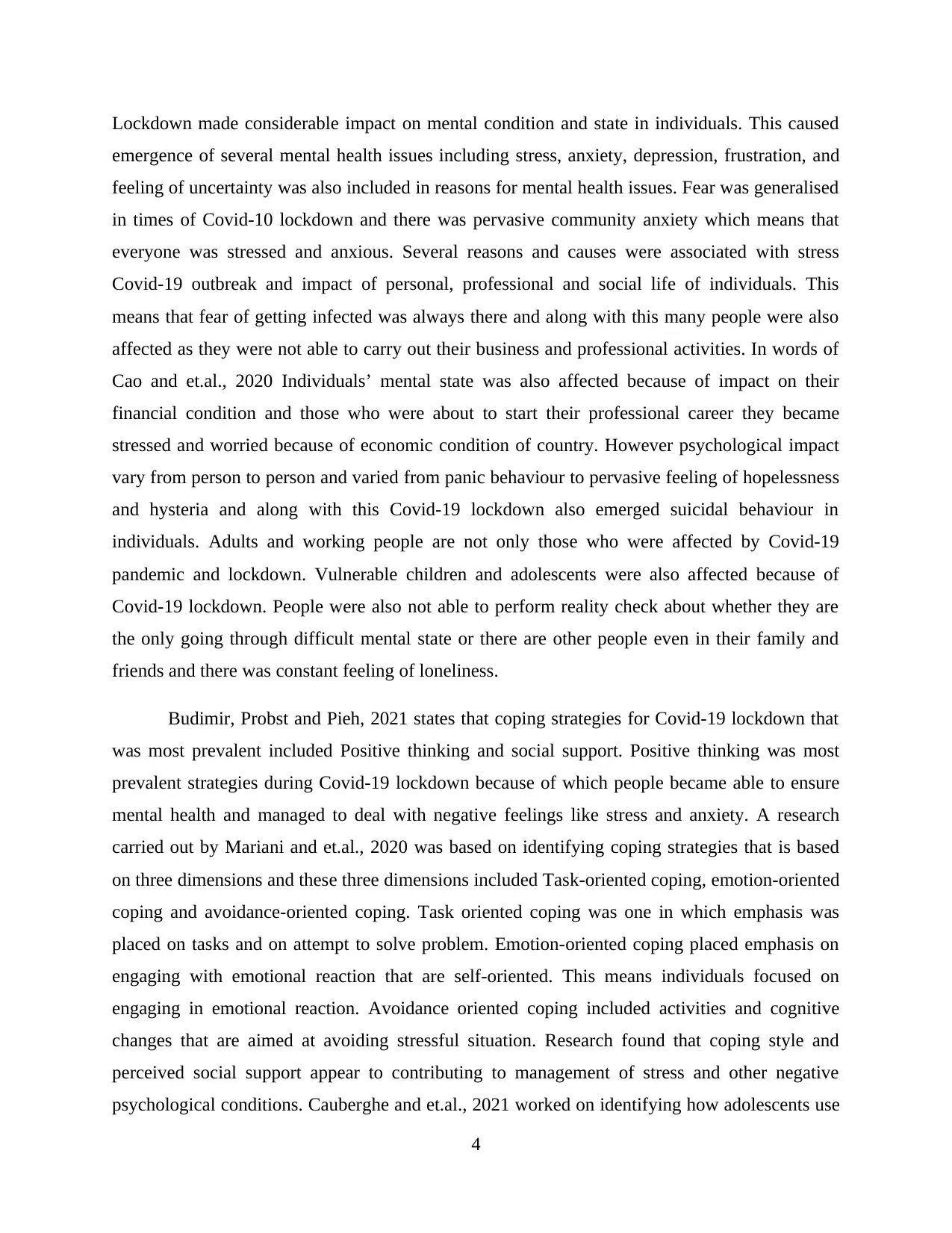
Lockdown made considerable impact on mental condition and state in individuals. This caused
emergence of several mental health issues including stress, anxiety, depression, frustration, and
feeling of uncertainty was also included in reasons for mental health issues. Fear was generalised
in times of Covid-10 lockdown and there was pervasive community anxiety which means that
everyone was stressed and anxious. Several reasons and causes were associated with stress
Covid-19 outbreak and impact of personal, professional and social life of individuals. This
means that fear of getting infected was always there and along with this many people were also
affected as they were not able to carry out their business and professional activities. In words of
Cao and et.al., 2020 Individuals’ mental state was also affected because of impact on their
financial condition and those who were about to start their professional career they became
stressed and worried because of economic condition of country. However psychological impact
vary from person to person and varied from panic behaviour to pervasive feeling of hopelessness
and hysteria and along with this Covid-19 lockdown also emerged suicidal behaviour in
individuals. Adults and working people are not only those who were affected by Covid-19
pandemic and lockdown. Vulnerable children and adolescents were also affected because of
Covid-19 lockdown. People were also not able to perform reality check about whether they are
the only going through difficult mental state or there are other people even in their family and
friends and there was constant feeling of loneliness.
Budimir, Probst and Pieh, 2021 states that coping strategies for Covid-19 lockdown that
was most prevalent included Positive thinking and social support. Positive thinking was most
prevalent strategies during Covid-19 lockdown because of which people became able to ensure
mental health and managed to deal with negative feelings like stress and anxiety. A research
carried out by Mariani and et.al., 2020 was based on identifying coping strategies that is based
on three dimensions and these three dimensions included Task-oriented coping, emotion-oriented
coping and avoidance-oriented coping. Task oriented coping was one in which emphasis was
placed on tasks and on attempt to solve problem. Emotion-oriented coping placed emphasis on
engaging with emotional reaction that are self-oriented. This means individuals focused on
engaging in emotional reaction. Avoidance oriented coping included activities and cognitive
changes that are aimed at avoiding stressful situation. Research found that coping style and
perceived social support appear to contributing to management of stress and other negative
psychological conditions. Cauberghe and et.al., 2021 worked on identifying how adolescents use
4
emergence of several mental health issues including stress, anxiety, depression, frustration, and
feeling of uncertainty was also included in reasons for mental health issues. Fear was generalised
in times of Covid-10 lockdown and there was pervasive community anxiety which means that
everyone was stressed and anxious. Several reasons and causes were associated with stress
Covid-19 outbreak and impact of personal, professional and social life of individuals. This
means that fear of getting infected was always there and along with this many people were also
affected as they were not able to carry out their business and professional activities. In words of
Cao and et.al., 2020 Individuals’ mental state was also affected because of impact on their
financial condition and those who were about to start their professional career they became
stressed and worried because of economic condition of country. However psychological impact
vary from person to person and varied from panic behaviour to pervasive feeling of hopelessness
and hysteria and along with this Covid-19 lockdown also emerged suicidal behaviour in
individuals. Adults and working people are not only those who were affected by Covid-19
pandemic and lockdown. Vulnerable children and adolescents were also affected because of
Covid-19 lockdown. People were also not able to perform reality check about whether they are
the only going through difficult mental state or there are other people even in their family and
friends and there was constant feeling of loneliness.
Budimir, Probst and Pieh, 2021 states that coping strategies for Covid-19 lockdown that
was most prevalent included Positive thinking and social support. Positive thinking was most
prevalent strategies during Covid-19 lockdown because of which people became able to ensure
mental health and managed to deal with negative feelings like stress and anxiety. A research
carried out by Mariani and et.al., 2020 was based on identifying coping strategies that is based
on three dimensions and these three dimensions included Task-oriented coping, emotion-oriented
coping and avoidance-oriented coping. Task oriented coping was one in which emphasis was
placed on tasks and on attempt to solve problem. Emotion-oriented coping placed emphasis on
engaging with emotional reaction that are self-oriented. This means individuals focused on
engaging in emotional reaction. Avoidance oriented coping included activities and cognitive
changes that are aimed at avoiding stressful situation. Research found that coping style and
perceived social support appear to contributing to management of stress and other negative
psychological conditions. Cauberghe and et.al., 2021 worked on identifying how adolescents use
4
Paraphrase This Document
Need a fresh take? Get an instant paraphrase of this document with our AI Paraphraser
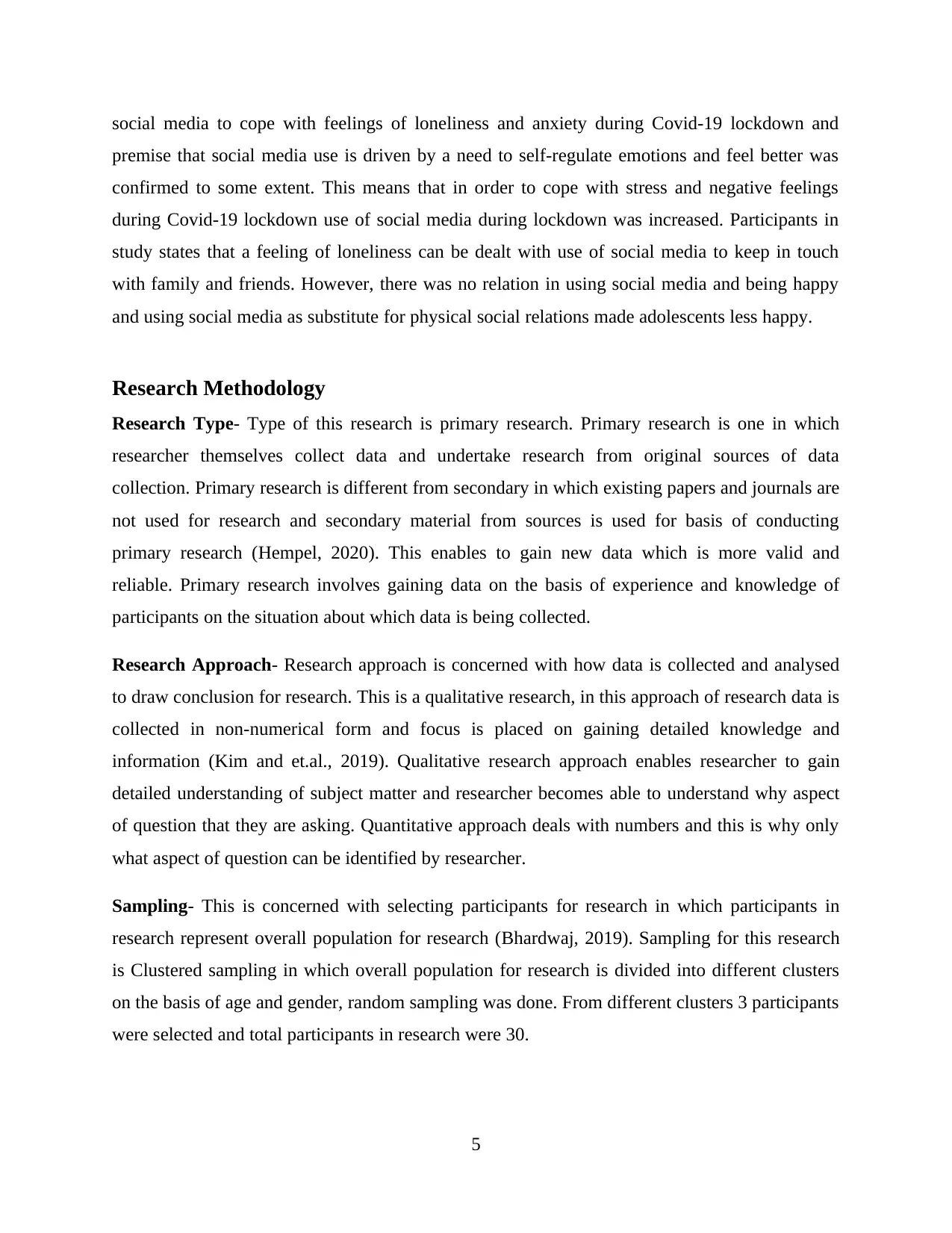
social media to cope with feelings of loneliness and anxiety during Covid-19 lockdown and
premise that social media use is driven by a need to self-regulate emotions and feel better was
confirmed to some extent. This means that in order to cope with stress and negative feelings
during Covid-19 lockdown use of social media during lockdown was increased. Participants in
study states that a feeling of loneliness can be dealt with use of social media to keep in touch
with family and friends. However, there was no relation in using social media and being happy
and using social media as substitute for physical social relations made adolescents less happy.
Research Methodology
Research Type- Type of this research is primary research. Primary research is one in which
researcher themselves collect data and undertake research from original sources of data
collection. Primary research is different from secondary in which existing papers and journals are
not used for research and secondary material from sources is used for basis of conducting
primary research (Hempel, 2020). This enables to gain new data which is more valid and
reliable. Primary research involves gaining data on the basis of experience and knowledge of
participants on the situation about which data is being collected.
Research Approach- Research approach is concerned with how data is collected and analysed
to draw conclusion for research. This is a qualitative research, in this approach of research data is
collected in non-numerical form and focus is placed on gaining detailed knowledge and
information (Kim and et.al., 2019). Qualitative research approach enables researcher to gain
detailed understanding of subject matter and researcher becomes able to understand why aspect
of question that they are asking. Quantitative approach deals with numbers and this is why only
what aspect of question can be identified by researcher.
Sampling- This is concerned with selecting participants for research in which participants in
research represent overall population for research (Bhardwaj, 2019). Sampling for this research
is Clustered sampling in which overall population for research is divided into different clusters
on the basis of age and gender, random sampling was done. From different clusters 3 participants
were selected and total participants in research were 30.
5
premise that social media use is driven by a need to self-regulate emotions and feel better was
confirmed to some extent. This means that in order to cope with stress and negative feelings
during Covid-19 lockdown use of social media during lockdown was increased. Participants in
study states that a feeling of loneliness can be dealt with use of social media to keep in touch
with family and friends. However, there was no relation in using social media and being happy
and using social media as substitute for physical social relations made adolescents less happy.
Research Methodology
Research Type- Type of this research is primary research. Primary research is one in which
researcher themselves collect data and undertake research from original sources of data
collection. Primary research is different from secondary in which existing papers and journals are
not used for research and secondary material from sources is used for basis of conducting
primary research (Hempel, 2020). This enables to gain new data which is more valid and
reliable. Primary research involves gaining data on the basis of experience and knowledge of
participants on the situation about which data is being collected.
Research Approach- Research approach is concerned with how data is collected and analysed
to draw conclusion for research. This is a qualitative research, in this approach of research data is
collected in non-numerical form and focus is placed on gaining detailed knowledge and
information (Kim and et.al., 2019). Qualitative research approach enables researcher to gain
detailed understanding of subject matter and researcher becomes able to understand why aspect
of question that they are asking. Quantitative approach deals with numbers and this is why only
what aspect of question can be identified by researcher.
Sampling- This is concerned with selecting participants for research in which participants in
research represent overall population for research (Bhardwaj, 2019). Sampling for this research
is Clustered sampling in which overall population for research is divided into different clusters
on the basis of age and gender, random sampling was done. From different clusters 3 participants
were selected and total participants in research were 30.
5
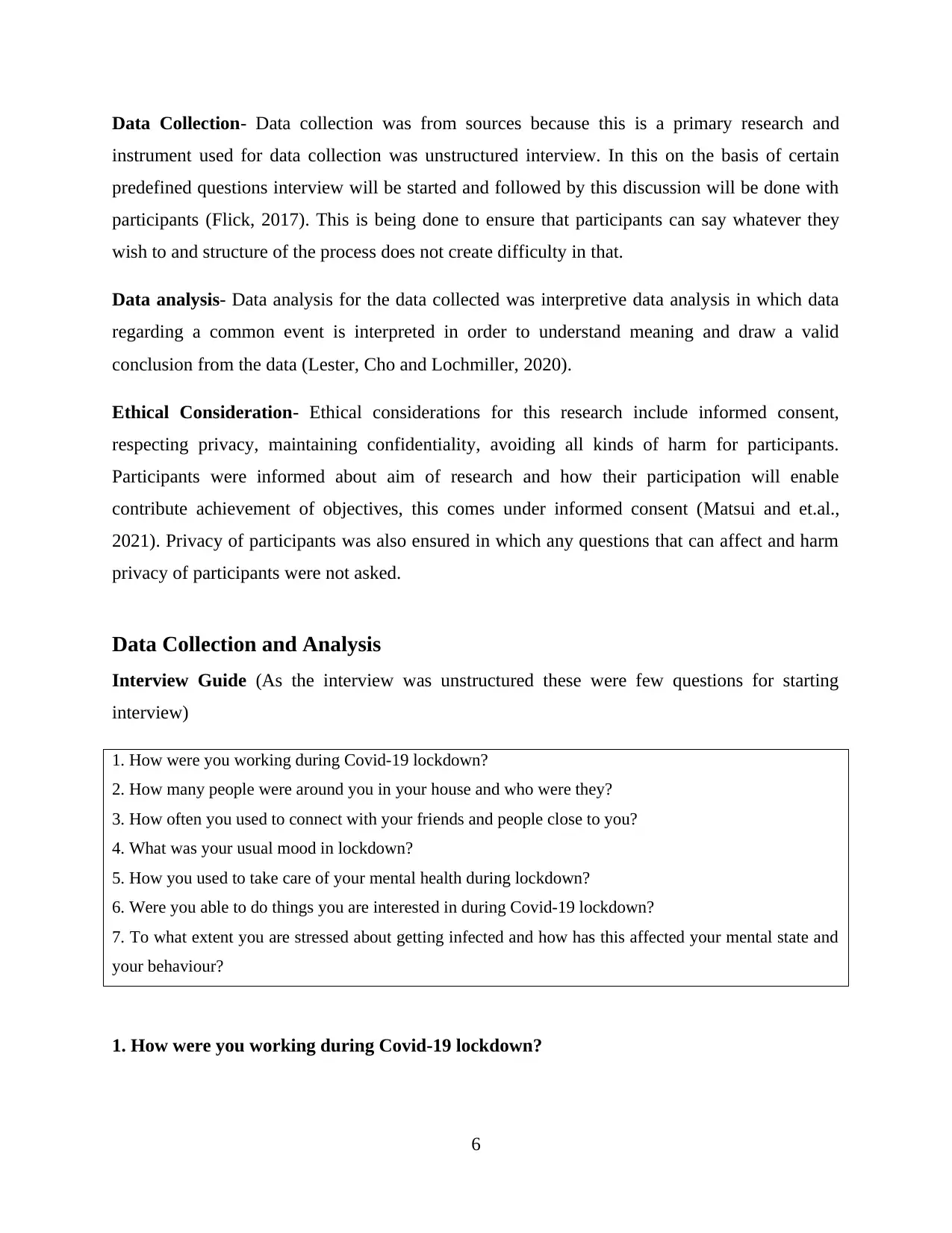
Data Collection- Data collection was from sources because this is a primary research and
instrument used for data collection was unstructured interview. In this on the basis of certain
predefined questions interview will be started and followed by this discussion will be done with
participants (Flick, 2017). This is being done to ensure that participants can say whatever they
wish to and structure of the process does not create difficulty in that.
Data analysis- Data analysis for the data collected was interpretive data analysis in which data
regarding a common event is interpreted in order to understand meaning and draw a valid
conclusion from the data (Lester, Cho and Lochmiller, 2020).
Ethical Consideration- Ethical considerations for this research include informed consent,
respecting privacy, maintaining confidentiality, avoiding all kinds of harm for participants.
Participants were informed about aim of research and how their participation will enable
contribute achievement of objectives, this comes under informed consent (Matsui and et.al.,
2021). Privacy of participants was also ensured in which any questions that can affect and harm
privacy of participants were not asked.
Data Collection and Analysis
Interview Guide (As the interview was unstructured these were few questions for starting
interview)
1. How were you working during Covid-19 lockdown?
2. How many people were around you in your house and who were they?
3. How often you used to connect with your friends and people close to you?
4. What was your usual mood in lockdown?
5. How you used to take care of your mental health during lockdown?
6. Were you able to do things you are interested in during Covid-19 lockdown?
7. To what extent you are stressed about getting infected and how has this affected your mental state and
your behaviour?
1. How were you working during Covid-19 lockdown?
6
instrument used for data collection was unstructured interview. In this on the basis of certain
predefined questions interview will be started and followed by this discussion will be done with
participants (Flick, 2017). This is being done to ensure that participants can say whatever they
wish to and structure of the process does not create difficulty in that.
Data analysis- Data analysis for the data collected was interpretive data analysis in which data
regarding a common event is interpreted in order to understand meaning and draw a valid
conclusion from the data (Lester, Cho and Lochmiller, 2020).
Ethical Consideration- Ethical considerations for this research include informed consent,
respecting privacy, maintaining confidentiality, avoiding all kinds of harm for participants.
Participants were informed about aim of research and how their participation will enable
contribute achievement of objectives, this comes under informed consent (Matsui and et.al.,
2021). Privacy of participants was also ensured in which any questions that can affect and harm
privacy of participants were not asked.
Data Collection and Analysis
Interview Guide (As the interview was unstructured these were few questions for starting
interview)
1. How were you working during Covid-19 lockdown?
2. How many people were around you in your house and who were they?
3. How often you used to connect with your friends and people close to you?
4. What was your usual mood in lockdown?
5. How you used to take care of your mental health during lockdown?
6. Were you able to do things you are interested in during Covid-19 lockdown?
7. To what extent you are stressed about getting infected and how has this affected your mental state and
your behaviour?
1. How were you working during Covid-19 lockdown?
6
⊘ This is a preview!⊘
Do you want full access?
Subscribe today to unlock all pages.

Trusted by 1+ million students worldwide
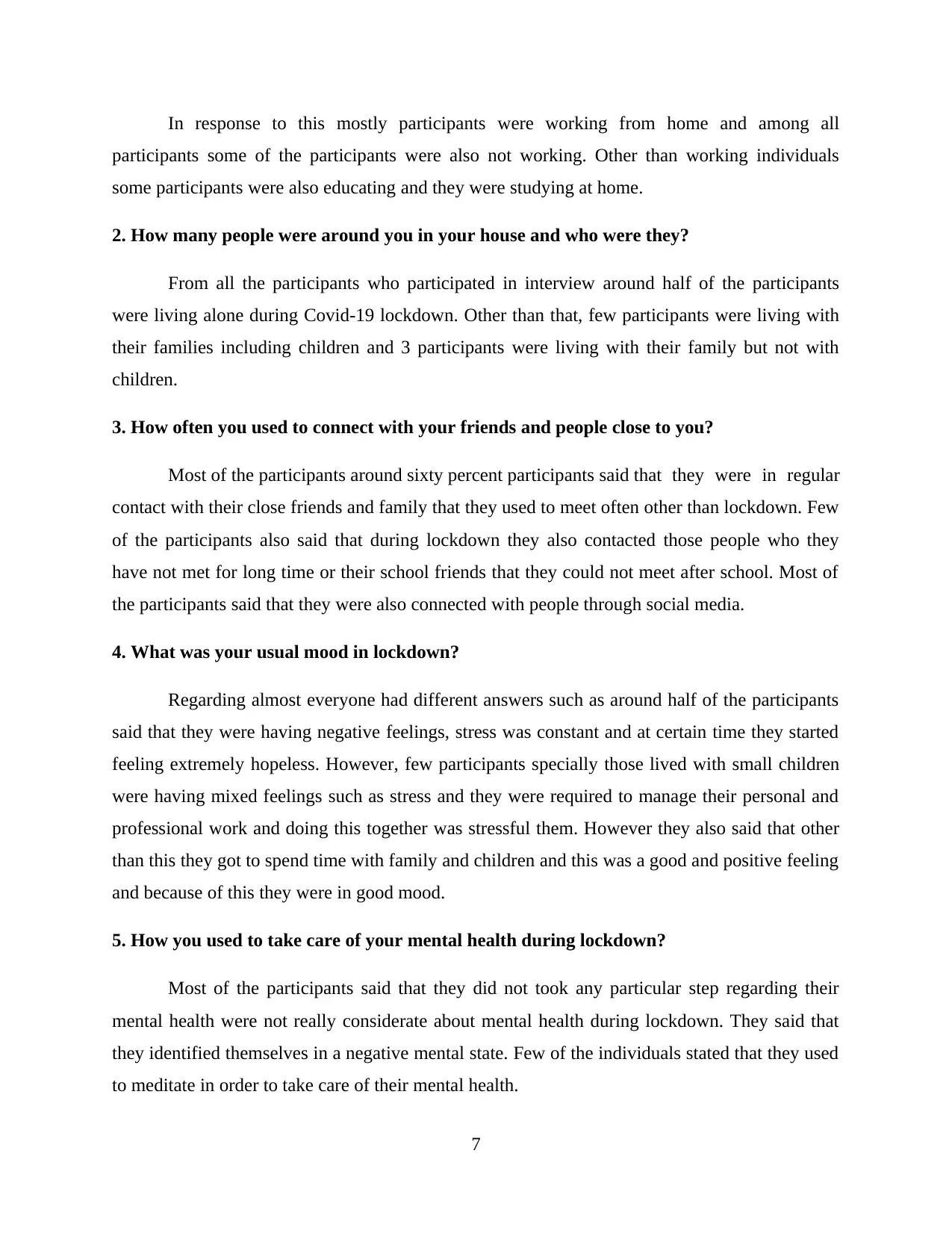
In response to this mostly participants were working from home and among all
participants some of the participants were also not working. Other than working individuals
some participants were also educating and they were studying at home.
2. How many people were around you in your house and who were they?
From all the participants who participated in interview around half of the participants
were living alone during Covid-19 lockdown. Other than that, few participants were living with
their families including children and 3 participants were living with their family but not with
children.
3. How often you used to connect with your friends and people close to you?
Most of the participants around sixty percent participants said that they were in regular
contact with their close friends and family that they used to meet often other than lockdown. Few
of the participants also said that during lockdown they also contacted those people who they
have not met for long time or their school friends that they could not meet after school. Most of
the participants said that they were also connected with people through social media.
4. What was your usual mood in lockdown?
Regarding almost everyone had different answers such as around half of the participants
said that they were having negative feelings, stress was constant and at certain time they started
feeling extremely hopeless. However, few participants specially those lived with small children
were having mixed feelings such as stress and they were required to manage their personal and
professional work and doing this together was stressful them. However they also said that other
than this they got to spend time with family and children and this was a good and positive feeling
and because of this they were in good mood.
5. How you used to take care of your mental health during lockdown?
Most of the participants said that they did not took any particular step regarding their
mental health were not really considerate about mental health during lockdown. They said that
they identified themselves in a negative mental state. Few of the individuals stated that they used
to meditate in order to take care of their mental health.
7
participants some of the participants were also not working. Other than working individuals
some participants were also educating and they were studying at home.
2. How many people were around you in your house and who were they?
From all the participants who participated in interview around half of the participants
were living alone during Covid-19 lockdown. Other than that, few participants were living with
their families including children and 3 participants were living with their family but not with
children.
3. How often you used to connect with your friends and people close to you?
Most of the participants around sixty percent participants said that they were in regular
contact with their close friends and family that they used to meet often other than lockdown. Few
of the participants also said that during lockdown they also contacted those people who they
have not met for long time or their school friends that they could not meet after school. Most of
the participants said that they were also connected with people through social media.
4. What was your usual mood in lockdown?
Regarding almost everyone had different answers such as around half of the participants
said that they were having negative feelings, stress was constant and at certain time they started
feeling extremely hopeless. However, few participants specially those lived with small children
were having mixed feelings such as stress and they were required to manage their personal and
professional work and doing this together was stressful them. However they also said that other
than this they got to spend time with family and children and this was a good and positive feeling
and because of this they were in good mood.
5. How you used to take care of your mental health during lockdown?
Most of the participants said that they did not took any particular step regarding their
mental health were not really considerate about mental health during lockdown. They said that
they identified themselves in a negative mental state. Few of the individuals stated that they used
to meditate in order to take care of their mental health.
7
Paraphrase This Document
Need a fresh take? Get an instant paraphrase of this document with our AI Paraphraser
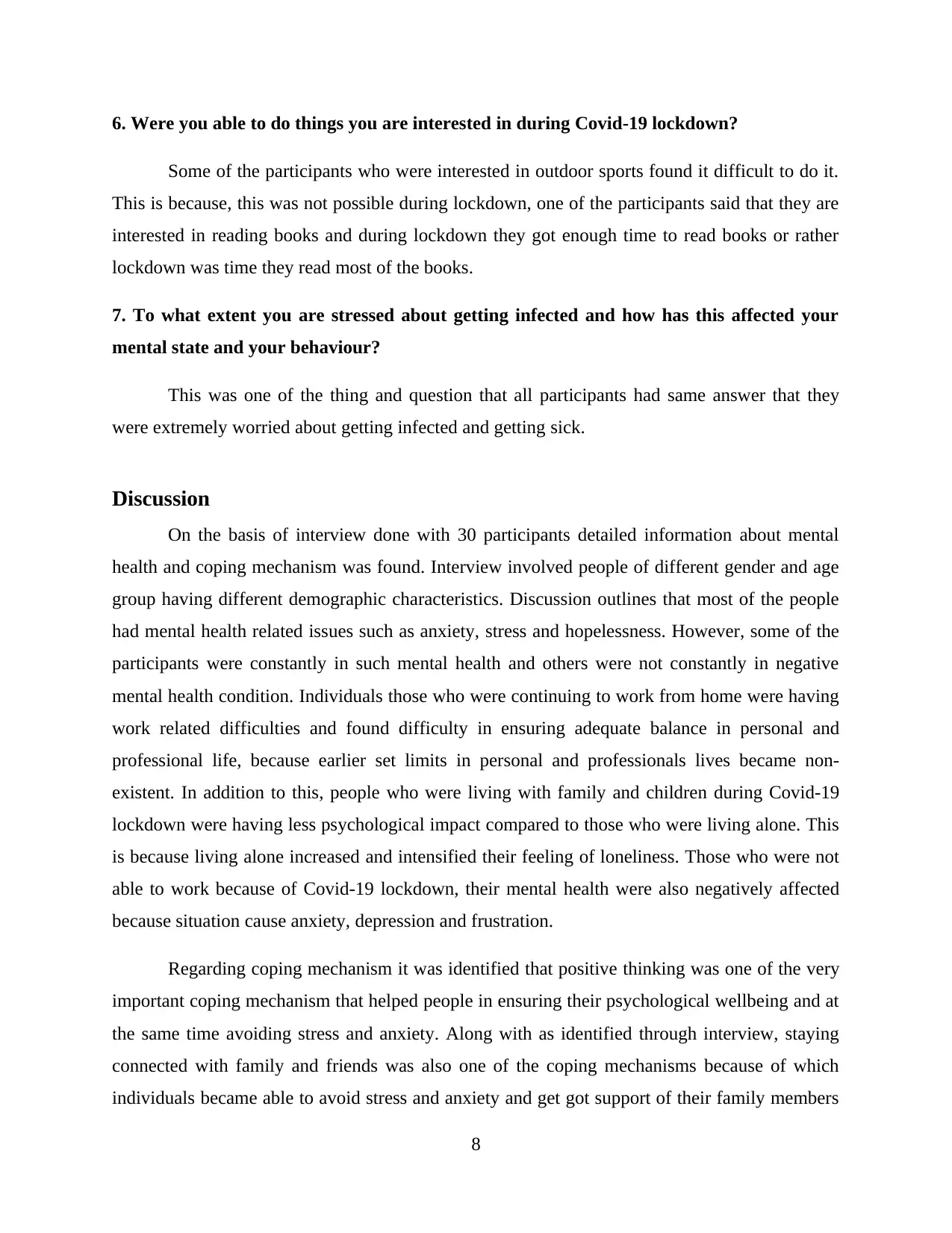
6. Were you able to do things you are interested in during Covid-19 lockdown?
Some of the participants who were interested in outdoor sports found it difficult to do it.
This is because, this was not possible during lockdown, one of the participants said that they are
interested in reading books and during lockdown they got enough time to read books or rather
lockdown was time they read most of the books.
7. To what extent you are stressed about getting infected and how has this affected your
mental state and your behaviour?
This was one of the thing and question that all participants had same answer that they
were extremely worried about getting infected and getting sick.
Discussion
On the basis of interview done with 30 participants detailed information about mental
health and coping mechanism was found. Interview involved people of different gender and age
group having different demographic characteristics. Discussion outlines that most of the people
had mental health related issues such as anxiety, stress and hopelessness. However, some of the
participants were constantly in such mental health and others were not constantly in negative
mental health condition. Individuals those who were continuing to work from home were having
work related difficulties and found difficulty in ensuring adequate balance in personal and
professional life, because earlier set limits in personal and professionals lives became non-
existent. In addition to this, people who were living with family and children during Covid-19
lockdown were having less psychological impact compared to those who were living alone. This
is because living alone increased and intensified their feeling of loneliness. Those who were not
able to work because of Covid-19 lockdown, their mental health were also negatively affected
because situation cause anxiety, depression and frustration.
Regarding coping mechanism it was identified that positive thinking was one of the very
important coping mechanism that helped people in ensuring their psychological wellbeing and at
the same time avoiding stress and anxiety. Along with as identified through interview, staying
connected with family and friends was also one of the coping mechanisms because of which
individuals became able to avoid stress and anxiety and get got support of their family members
8
Some of the participants who were interested in outdoor sports found it difficult to do it.
This is because, this was not possible during lockdown, one of the participants said that they are
interested in reading books and during lockdown they got enough time to read books or rather
lockdown was time they read most of the books.
7. To what extent you are stressed about getting infected and how has this affected your
mental state and your behaviour?
This was one of the thing and question that all participants had same answer that they
were extremely worried about getting infected and getting sick.
Discussion
On the basis of interview done with 30 participants detailed information about mental
health and coping mechanism was found. Interview involved people of different gender and age
group having different demographic characteristics. Discussion outlines that most of the people
had mental health related issues such as anxiety, stress and hopelessness. However, some of the
participants were constantly in such mental health and others were not constantly in negative
mental health condition. Individuals those who were continuing to work from home were having
work related difficulties and found difficulty in ensuring adequate balance in personal and
professional life, because earlier set limits in personal and professionals lives became non-
existent. In addition to this, people who were living with family and children during Covid-19
lockdown were having less psychological impact compared to those who were living alone. This
is because living alone increased and intensified their feeling of loneliness. Those who were not
able to work because of Covid-19 lockdown, their mental health were also negatively affected
because situation cause anxiety, depression and frustration.
Regarding coping mechanism it was identified that positive thinking was one of the very
important coping mechanism that helped people in ensuring their psychological wellbeing and at
the same time avoiding stress and anxiety. Along with as identified through interview, staying
connected with family and friends was also one of the coping mechanisms because of which
individuals became able to avoid stress and anxiety and get got support of their family members
8
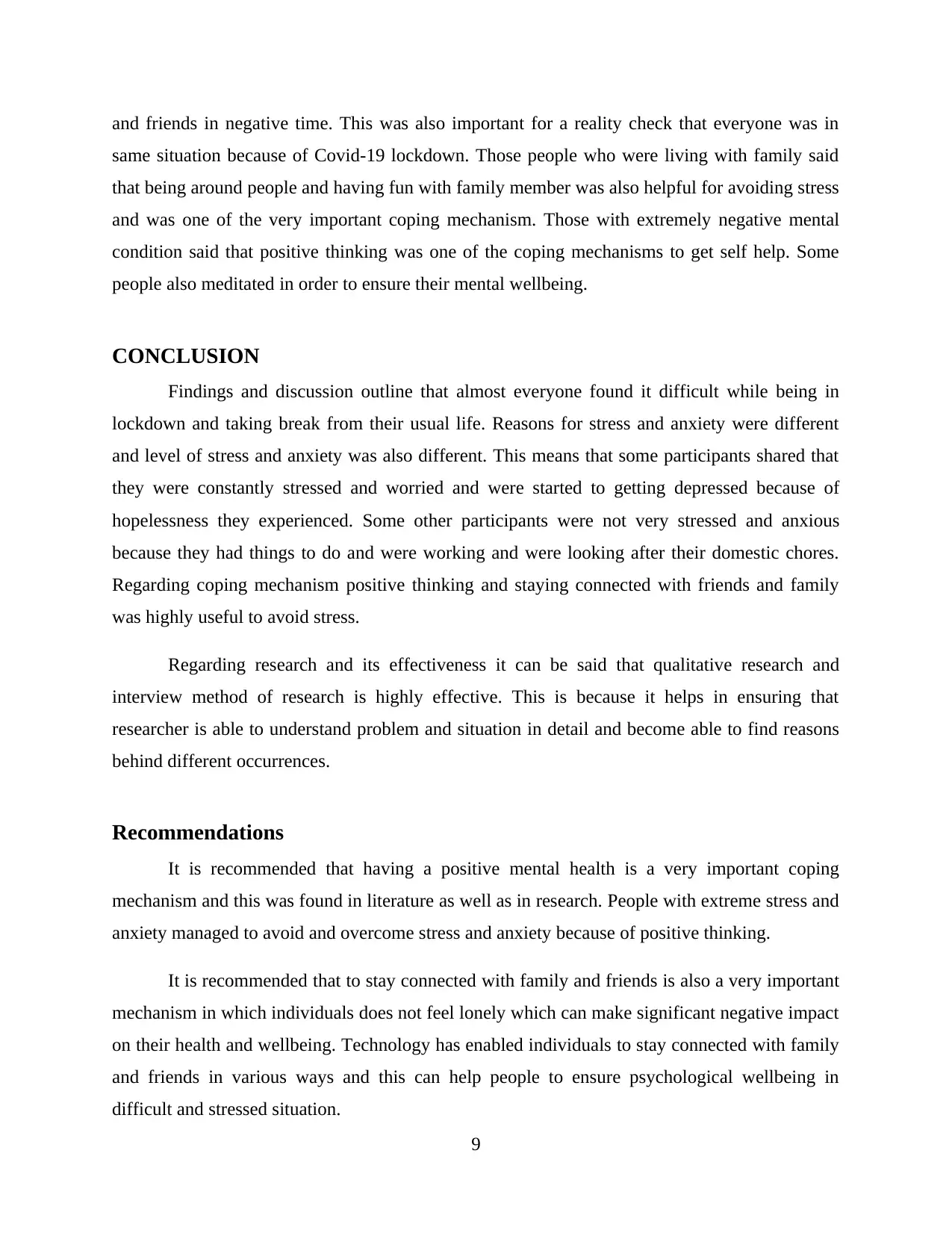
and friends in negative time. This was also important for a reality check that everyone was in
same situation because of Covid-19 lockdown. Those people who were living with family said
that being around people and having fun with family member was also helpful for avoiding stress
and was one of the very important coping mechanism. Those with extremely negative mental
condition said that positive thinking was one of the coping mechanisms to get self help. Some
people also meditated in order to ensure their mental wellbeing.
CONCLUSION
Findings and discussion outline that almost everyone found it difficult while being in
lockdown and taking break from their usual life. Reasons for stress and anxiety were different
and level of stress and anxiety was also different. This means that some participants shared that
they were constantly stressed and worried and were started to getting depressed because of
hopelessness they experienced. Some other participants were not very stressed and anxious
because they had things to do and were working and were looking after their domestic chores.
Regarding coping mechanism positive thinking and staying connected with friends and family
was highly useful to avoid stress.
Regarding research and its effectiveness it can be said that qualitative research and
interview method of research is highly effective. This is because it helps in ensuring that
researcher is able to understand problem and situation in detail and become able to find reasons
behind different occurrences.
Recommendations
It is recommended that having a positive mental health is a very important coping
mechanism and this was found in literature as well as in research. People with extreme stress and
anxiety managed to avoid and overcome stress and anxiety because of positive thinking.
It is recommended that to stay connected with family and friends is also a very important
mechanism in which individuals does not feel lonely which can make significant negative impact
on their health and wellbeing. Technology has enabled individuals to stay connected with family
and friends in various ways and this can help people to ensure psychological wellbeing in
difficult and stressed situation.
9
same situation because of Covid-19 lockdown. Those people who were living with family said
that being around people and having fun with family member was also helpful for avoiding stress
and was one of the very important coping mechanism. Those with extremely negative mental
condition said that positive thinking was one of the coping mechanisms to get self help. Some
people also meditated in order to ensure their mental wellbeing.
CONCLUSION
Findings and discussion outline that almost everyone found it difficult while being in
lockdown and taking break from their usual life. Reasons for stress and anxiety were different
and level of stress and anxiety was also different. This means that some participants shared that
they were constantly stressed and worried and were started to getting depressed because of
hopelessness they experienced. Some other participants were not very stressed and anxious
because they had things to do and were working and were looking after their domestic chores.
Regarding coping mechanism positive thinking and staying connected with friends and family
was highly useful to avoid stress.
Regarding research and its effectiveness it can be said that qualitative research and
interview method of research is highly effective. This is because it helps in ensuring that
researcher is able to understand problem and situation in detail and become able to find reasons
behind different occurrences.
Recommendations
It is recommended that having a positive mental health is a very important coping
mechanism and this was found in literature as well as in research. People with extreme stress and
anxiety managed to avoid and overcome stress and anxiety because of positive thinking.
It is recommended that to stay connected with family and friends is also a very important
mechanism in which individuals does not feel lonely which can make significant negative impact
on their health and wellbeing. Technology has enabled individuals to stay connected with family
and friends in various ways and this can help people to ensure psychological wellbeing in
difficult and stressed situation.
9
⊘ This is a preview!⊘
Do you want full access?
Subscribe today to unlock all pages.

Trusted by 1+ million students worldwide
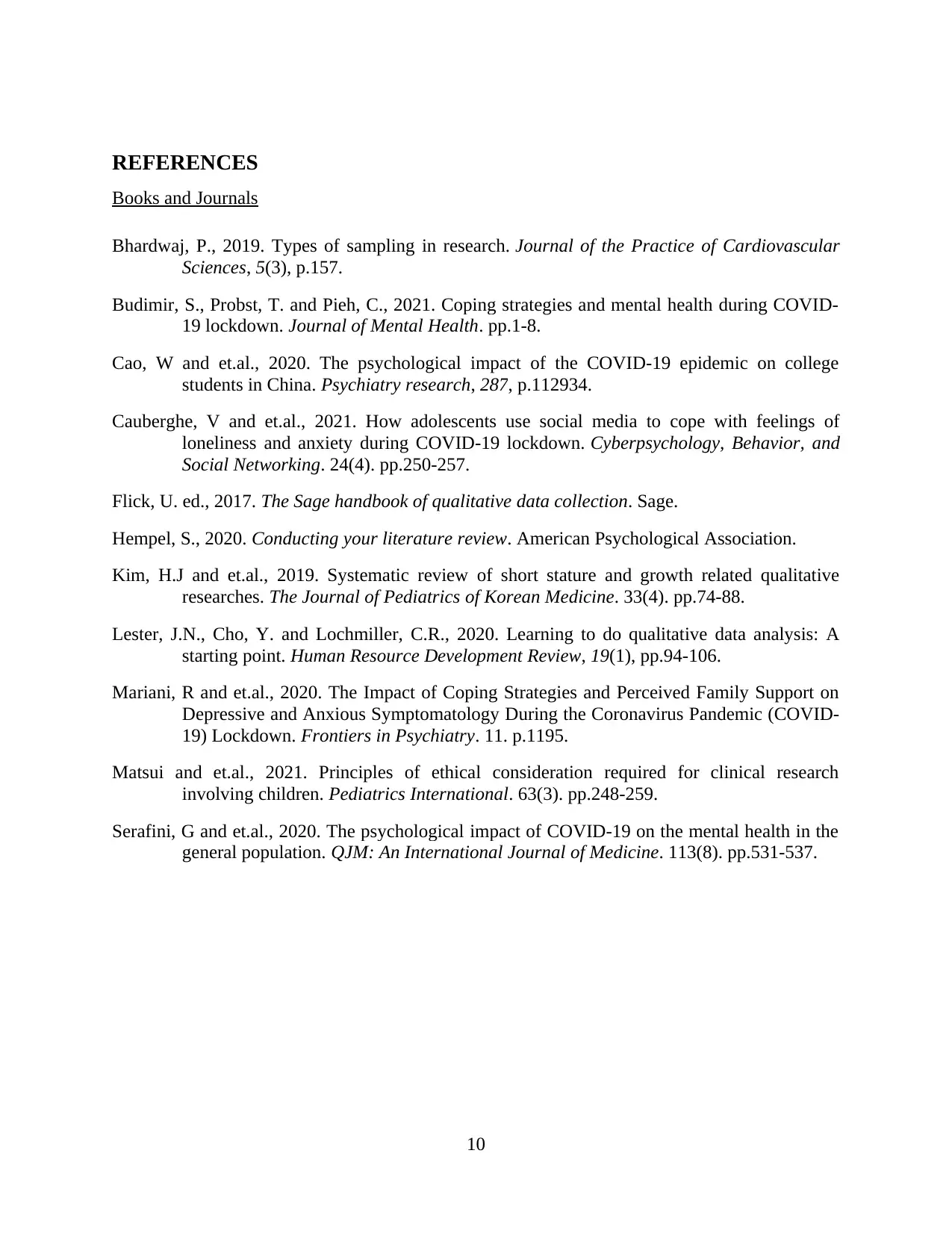
REFERENCES
Books and Journals
Bhardwaj, P., 2019. Types of sampling in research. Journal of the Practice of Cardiovascular
Sciences, 5(3), p.157.
Budimir, S., Probst, T. and Pieh, C., 2021. Coping strategies and mental health during COVID-
19 lockdown. Journal of Mental Health. pp.1-8.
Cao, W and et.al., 2020. The psychological impact of the COVID-19 epidemic on college
students in China. Psychiatry research, 287, p.112934.
Cauberghe, V and et.al., 2021. How adolescents use social media to cope with feelings of
loneliness and anxiety during COVID-19 lockdown. Cyberpsychology, Behavior, and
Social Networking. 24(4). pp.250-257.
Flick, U. ed., 2017. The Sage handbook of qualitative data collection. Sage.
Hempel, S., 2020. Conducting your literature review. American Psychological Association.
Kim, H.J and et.al., 2019. Systematic review of short stature and growth related qualitative
researches. The Journal of Pediatrics of Korean Medicine. 33(4). pp.74-88.
Lester, J.N., Cho, Y. and Lochmiller, C.R., 2020. Learning to do qualitative data analysis: A
starting point. Human Resource Development Review, 19(1), pp.94-106.
Mariani, R and et.al., 2020. The Impact of Coping Strategies and Perceived Family Support on
Depressive and Anxious Symptomatology During the Coronavirus Pandemic (COVID-
19) Lockdown. Frontiers in Psychiatry. 11. p.1195.
Matsui and et.al., 2021. Principles of ethical consideration required for clinical research
involving children. Pediatrics International. 63(3). pp.248-259.
Serafini, G and et.al., 2020. The psychological impact of COVID-19 on the mental health in the
general population. QJM: An International Journal of Medicine. 113(8). pp.531-537.
10
Books and Journals
Bhardwaj, P., 2019. Types of sampling in research. Journal of the Practice of Cardiovascular
Sciences, 5(3), p.157.
Budimir, S., Probst, T. and Pieh, C., 2021. Coping strategies and mental health during COVID-
19 lockdown. Journal of Mental Health. pp.1-8.
Cao, W and et.al., 2020. The psychological impact of the COVID-19 epidemic on college
students in China. Psychiatry research, 287, p.112934.
Cauberghe, V and et.al., 2021. How adolescents use social media to cope with feelings of
loneliness and anxiety during COVID-19 lockdown. Cyberpsychology, Behavior, and
Social Networking. 24(4). pp.250-257.
Flick, U. ed., 2017. The Sage handbook of qualitative data collection. Sage.
Hempel, S., 2020. Conducting your literature review. American Psychological Association.
Kim, H.J and et.al., 2019. Systematic review of short stature and growth related qualitative
researches. The Journal of Pediatrics of Korean Medicine. 33(4). pp.74-88.
Lester, J.N., Cho, Y. and Lochmiller, C.R., 2020. Learning to do qualitative data analysis: A
starting point. Human Resource Development Review, 19(1), pp.94-106.
Mariani, R and et.al., 2020. The Impact of Coping Strategies and Perceived Family Support on
Depressive and Anxious Symptomatology During the Coronavirus Pandemic (COVID-
19) Lockdown. Frontiers in Psychiatry. 11. p.1195.
Matsui and et.al., 2021. Principles of ethical consideration required for clinical research
involving children. Pediatrics International. 63(3). pp.248-259.
Serafini, G and et.al., 2020. The psychological impact of COVID-19 on the mental health in the
general population. QJM: An International Journal of Medicine. 113(8). pp.531-537.
10
1 out of 10
Related Documents
Your All-in-One AI-Powered Toolkit for Academic Success.
+13062052269
info@desklib.com
Available 24*7 on WhatsApp / Email
![[object Object]](/_next/static/media/star-bottom.7253800d.svg)
Unlock your academic potential
Copyright © 2020–2026 A2Z Services. All Rights Reserved. Developed and managed by ZUCOL.




